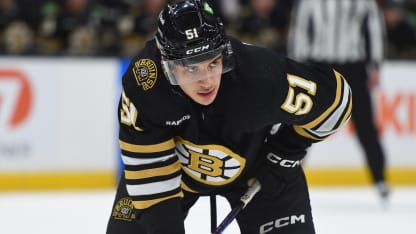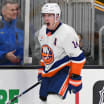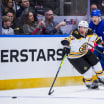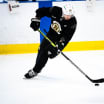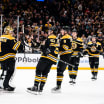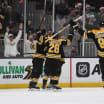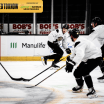Boston’s general manager did establish that Poitras will return to Boston upon the conclusion of the tournament, which – in some ways – will act as a bit of a reprieve from the NHL grind, something that the Bruins were already mindful of as they began to prioritize “load management” over the last several weeks.
“We had a plan in place, as you might be aware, in more recent weeks that we needed to back off a little bit what his load was,” said Sweeney. “It’s a lot of hockey, and there's a lot of pressure associated with that. I think it gets him a chance, mentally and physically, to have a little bit of a reset, go and play against your peer group – now again, it's high expectations and high-leverage, pressured situations that he's now been thrust into at the highest level you can possibly play at.
“He should handle that well, he should take those things that happen in our locker room and impart them on his new teammates, and lead from the front, and that's what we're hoping for.
“He'll come back and reinsert himself with us. It's a tough challenge to get right back on the road and go to the West Coast, so we have to monitor that when he gets back. But he's coming back to join the Boston Bruins and continue along the path that he's been, which has been outstanding so far.”
Sweeney believes that Poitras having been reassured that he’ll be back with the Bruins after World Juniors “probably takes a little pressure off.”
“He's coming back, he's earned that, we made that commitment to him,” said Sweeney. “He'll have to earn his right – just like he did coming out of training camp – to stay in our lineup and continue to contribute to our lineup. But I think the overall plan has been presented to him.
“We've certainly discussed it internally at length…not unlike when he doesn't play in the Island, but then turns around and plays against the Rangers on Saturday and has a little more renewed energy...
“I think that's all been received very well from him, but he's going through it for the first time, so he's going to have some mixed emotions.”
Poitras echoed Sweeney’s assessment that this could act as a strong “reset” for him ahead of the second half of the season.
"It definitely feels good that I'm going to be coming back here after, and I'm just going to keep working and competing every day, and try and earn more and more ice time, and try and build confidence in me from the coaches,” said Poitras, who has registered 13 points (five goals, eight assists) in 27 games this season.
“It's going to be a good reset. The NHL schedule is really grueling, traveling the day before games, being in a hotel a lot – it is pretty difficult. So, I'm sure it's going to be a good reset to kind of stay in one spot.”
Poitras hopes that the tournament will allow for his confidence to continue building and the habits he’s established at the NHL to keep developing.
“Just because I'm going to junior hockey doesn't mean I can't keep up the habits I’ve built here,” said Poitras. “I feel like I've been playing well, [the management and coaching staffs] said I look good. It's more just cleaning up little things, shorter shifts, and maybe some decisions that I'm not used to coming from the OHL.
“Or maybe I don't dump the puck in just because I have the ability to hold on to it, where here I'm going to get closed off, and maybe a turnover at the blue line’s going the other way, so just working on cleaning up a few things, dumping pucks in when you need to and kind of playing down low.”
Sweeney mentioned similar areas for improvement when asked how Poitras has handled having his minutes limited in the third period at various points over the last few weeks.
“There's a lot of guys that go through the league and get their ice time shortened. If you play long enough, you’re going to go through that,” said Sweeney. “Puck management, an extended shift in one case, it's just a real good learning opportunity. And that's exactly how was it was attributed, right back in the next night, and back in the situation, rebounding to play 14 minutes and contribute – not to strip away his confidence.
“Making sure that communication is really positive in that sense. But you’ve got to go through some growing pains at times that every player goes through. The league does get harder, and he's going through that for the first six months.
“As much as you want to talk to a player about that, you’ve got to go through it, live it.”
Sweeney added that he’s been pleased with how Poitras has responded to the adversity that’s come his way so far during his rookie campaign.
“It's just a steep learning curve, and he's handled it really well,” said Sweeney. “I mean, he comes back in some of the games where he's made a couple of booboos, and hasn't lost his confidence, will go out and play the next play…doesn't play in Long Island, watches – actually mentioned to me that sometimes it is really beneficial to watch how hard this league is, how big some of the D are and when they're going to close you off, and then he'll make a really good play that helps set up a goal against the Rangers.
“I love that about him. He’s going through it for the first time, but he's learning from each one of those experiences, tried to apply it, and hopefully he's a lot better off coming out the other side.”
With the emergence of Morgan Geekie as a viable center option over the past several games and Pavel Zacha’s return to practice on Monday, Sweeney acknowledged that the decision to send Poitras to World Juniors became a bit easier.
“Getting somewhat healthy leading up to this decision was certainly part of the process, and why we took this down to the wire to make our decision,” said Sweeney. “Hopefully we get Pav back this week…Geeks has played really well since he's come back from his injury, and that depth down the middle of the ice when he’s gone and played there, so we feel a little more comfortable where we are right now than where we had been a couple of weeks ago.
“But Matty will be missed because he's done a good job.”

